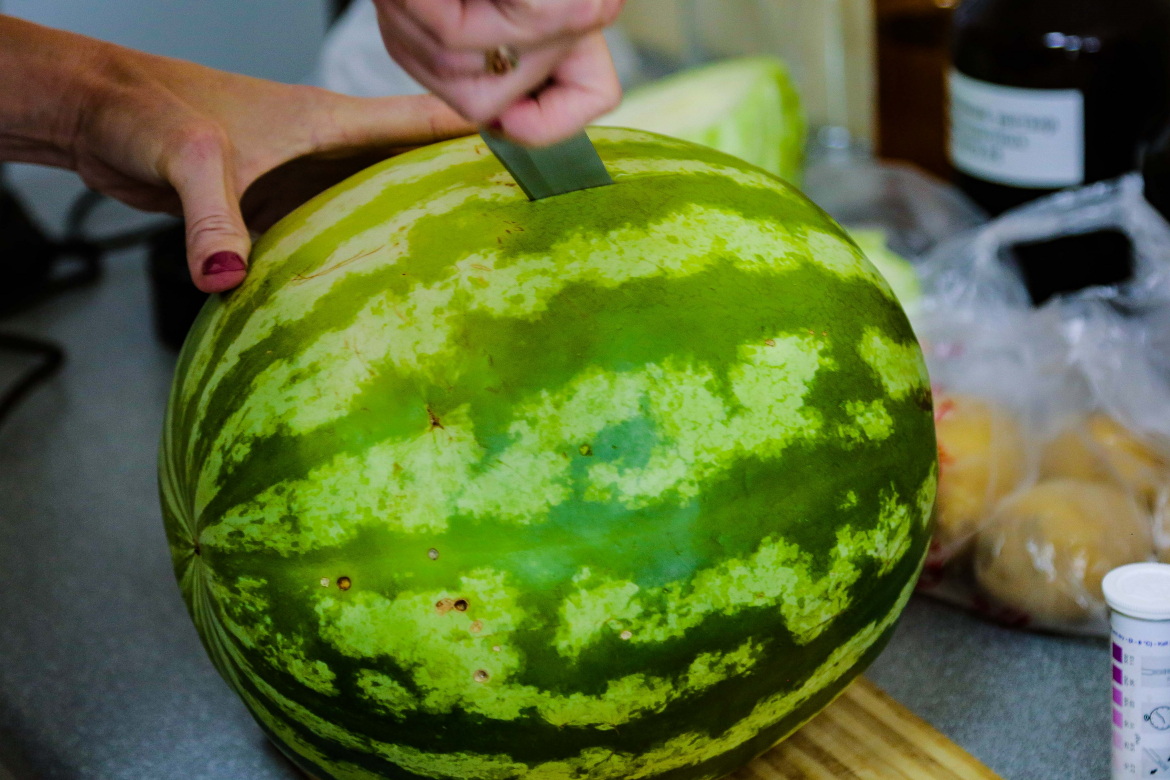Order a callback


Order a call

Order a service
 24.07.2017
24.07.2017
The season for the implementation of melons is already in full swing. However, there is an opinion that it is necessary to buy watermelons and melons only in August. Is it really? The journalists of El.KZ conducted their own investigation. In a vegetable stall near the office, they bought a "striped one" and took it to a laboratory where they conducted a study for the presence of nitrates.

According to Karligash Abdisheva, the head of the department for compliance with the requirements of technical regulations of the Public Health Department of the Committee for the Protection of Public Health, it is impossible for the consumer to determine whether there are nitrates and pesticides in watermelons or melons, only specialists can do it. The color of the product can only show its ripeness, but not the qualitative composition.
The laboratory assistant carefully rinses our "experimental" under running water. Such a procedure is done with all products coming to the National Expertise Center. At the same time, the center employee stresses that it is only to smear watermelons in containers.

For laboratory testing, only 10 grams is required.


"Any fruit and vegetable and crop production can be bought only under certain conditions. In this season, a special role does not play. For example, in stores watermelons are also sold, for the New Year. The most important thing when buying a watermelon is to pay attention to its external appearance. If there are cracks, watermelon bit or too dirty, then such a product canot be taken. Through the broken places in the fruit gets dirt, so there is a danger that it can be infected. In summer hot days it is necessary to buy products only at closed points, because with direct sun and water hit the product changes its properties," notes Karlygash Abdisheva.

According to her, one should not ask the seller to cut a watermelon when buying watermelon. After such an operation, dirt from the street can get into the berry. Moreover, no one can be sure of the cleanliness of the hands and knife with which the incision was made.

According to the plan approved by the Prosecutor General's Office, the specialists of the center conduct planned inspections of the main points for the sale of fruit and vegetable products in the city. This year, cases of poisoning by melons have not been recorded. In total for 2017, the branch of the Center for National Expertise in the city of Astana examined 2018 samples of products, of which 19 did not comply with the established standards, which is 0.9%. Single cases of non-compliance were found in potatoes, strawberries, zucchini, radish and radish.

Most often, vegetables and fruits are brought here from the markets "Shyryn", "Alash", "Big Shanghai", "Kok Bazar". At present, all fruits and vegetables and melons are delivered to the territory of Astana from the southern regions of Kazakhstan, as well as from Kyrgyzstan, Uzbekistan and China, but also products from exotic countries. In parallel with our watermelon experts carried out an examination of cabbage and potatoes.

"As a result of inspections against unscrupulous implementers and suppliers, appropriate measures are taken. We give the instruction that this product be withdrawn from sale and destroyed in the presence of a special commission, "added Karlygash Abdisheva.

The interlocutor notes that all products on the sale sites must be accompanied by documents that confirm compliance. Such is the declaration of conformity, which is formalized in accordance with the requirements of the Eurasian Economic Commission. References with the laboratory of outlets are not supporting documents.

"There were no poisonings from fruit and vegetable products in 2016-2017. There are times when a person turns and thinks that because of the use of watermelons, he became ill. In this case, most likely, the person himself did not observe the hygiene conditions: he did not wash his hands, did not wash the fruit, used it in unsanitary conditions," summed up Karlygash Abdisheva.

In the watermelon edition purchased, the content of nitrates turned out to be normal - 36 milligrams with an allowable value of 60 milligrams per kilogram. It is noteworthy that the norm for melons is 90 milligrams of nitrates per kilogram of product. "Eat for your health," the laboratory said.
Photo - Arman Mukhatov
The author of the article is Oleg Ryabchenko
http://el.kz/ru/news/vazhno_znat_/sanvrach__arbuzi_i_dini_mozhno_est__v_luboe_vremya_goda